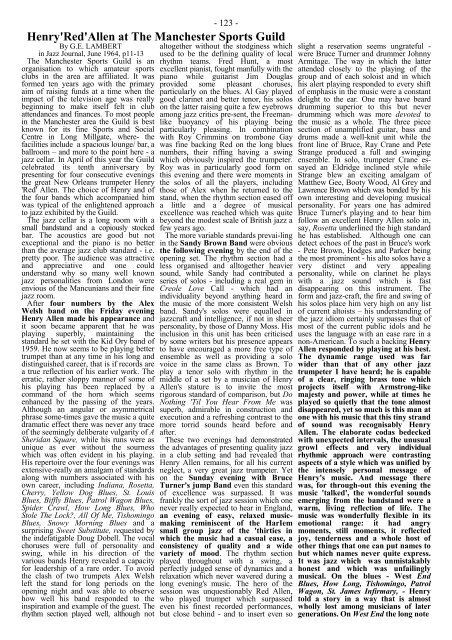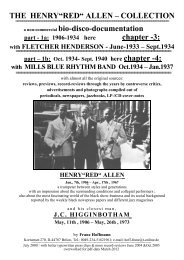Red Allen Chapters 9 - The Jazz Archive
Red Allen Chapters 9 - The Jazz Archive
Red Allen Chapters 9 - The Jazz Archive
Create successful ePaper yourself
Turn your PDF publications into a flip-book with our unique Google optimized e-Paper software.
- 123 -<br />
Henry'<strong>Red</strong>'<strong>Allen</strong> at <strong>The</strong> Manchester Sports Guild<br />
By G.E. LAMBERT<br />
in <strong>Jazz</strong> Journal, June 1964, p11-13<br />
<strong>The</strong> Manchester Sports Guild is an<br />
organisation to which amateur sports<br />
clubs in the area are affiliated. It was<br />
formed ten years ago with the primary<br />
aim of raising funds at a time when the<br />
impact of the television age was really<br />
beginning to make itself felt in club<br />
attendances and finances. To most people<br />
in the Manchester area the Guild is best<br />
known for its fine Sports and Social<br />
Centre in Long Millgate, where- the<br />
facilities include a spacious lounge/ bar, a<br />
ballroom – and more to the point here - a<br />
jazz cellar. In April of this year the Guild<br />
celebrated its tenth anniversary by<br />
presenting for four consecutive evenings<br />
the great New Orleans trumpeter Henry<br />
'<strong>Red</strong>' <strong>Allen</strong>. <strong>The</strong> choice of Henry and of<br />
the four bands which accompanied him<br />
was typical of the enlightened approach<br />
to jazz exhibited by the Guild.<br />
<strong>The</strong> jazz cellar is a long room with a<br />
small bandstand and a copiously stocked<br />
bar. <strong>The</strong> acoustics are good but not<br />
exceptional and the piano is no better<br />
than the average jazz club standard - i.e.<br />
pretty poor. <strong>The</strong> audience was attractive<br />
and appreciative and one could<br />
understand why so many well known<br />
jazz personalities from London were<br />
envious of the Mancunians and their fine<br />
jazz room.<br />
After four numbers by the Alex<br />
Welsh band on the Friday evening<br />
Henry <strong>Allen</strong> made his appearance and<br />
it soon became apparent that he was<br />
playing superbly, maintaining the<br />
standard he set with the Kid Ory band of<br />
1959. He now seems to be playing better<br />
trumpet than at any time in his long and<br />
distinguished career, that is if records are<br />
a true reflection of his earlier work. <strong>The</strong><br />
erratic, rather sloppy manner of some of<br />
his playing has been replaced by a<br />
command of the horn which seems<br />
enhanced by the passing of the years.<br />
Although an angular or asymmetrical<br />
phrase some-times gave the music a quite<br />
dramatic effect there was never any trace<br />
of the seemingly deliberate vulgarity of A<br />
Sheridan Square, while his runs were as<br />
unique as ever without the sourness<br />
which was often evident in his playing.<br />
His repertoire over the four evenings was<br />
extensive-really an amalgam of standards<br />
along with numbers associated with his<br />
own career, including Indiana, Rosetta,<br />
Cherry, Yellow Dog Blues, St. Louis<br />
Blues, Biffly Blues, Patrol Wagon Blues,<br />
Spider Crawl, How Long Blues, Who<br />
Stole <strong>The</strong> Lock?, All Of Me, Tishomingo<br />
Blues, Snowy Morning Blues and a<br />
surprising Sweet Substitute, requested by<br />
the indefatigable Doug Dobell. <strong>The</strong> vocal<br />
choruses were full of personality and<br />
swing, while in his direction of the<br />
various bands Henry revealed a capacity<br />
for leadership of a rare order. To avoid<br />
the clash of two trumpets Alex Welsh<br />
left the stand for long periods on the<br />
opening night and was able to observe<br />
how well his band responded to the<br />
inspiration and example of the guest. <strong>The</strong><br />
rhythm section played well, although not<br />
altogether without the stodginess which<br />
used to be the defining quality of local<br />
rhythm teams. Fred Hunt, a most<br />
excellent pianist, fought manfully with the<br />
piano while guitarist Jim Douglas<br />
provided some pleasant choruses,<br />
particularly on the blues. Al Gay played<br />
good clarinet and better tenor, his solos<br />
on the latter raising quite a few eyebrows<br />
among jazz critics pre-sent, the Freemanlike<br />
buoyancy of his playing being<br />
particularly pleasing. In combination<br />
with Roy Crimmins on trombone Gay<br />
was fine backing <strong>Red</strong> on the long blues<br />
numbers, their riffing having a swing<br />
which obviously inspired the trumpeter.<br />
Roy was in particularly good form on<br />
this evening and there were moments in<br />
the solos of all the players, including<br />
those of Alex when he returned to the<br />
stand, when the rhythm section eased off<br />
a little and a degree of musical<br />
excellence was reached which was quite<br />
beyond the modest scale of British jazz a<br />
few years ago.<br />
<strong>The</strong> more variable standards prevai-ling<br />
in the Sandy Brown Band were obvious<br />
the following evening by the end of the<br />
opening set. <strong>The</strong> rhythm section had a<br />
less organised and alltogether heavier<br />
sound, while Sandy had contributed a<br />
series of solos - including a real gem in<br />
Creole Love Call - which had an<br />
individuality beyond anything heard in<br />
the music of the more consistent Welsh<br />
band. Sandy's solos were equalled in<br />
jazzcraft and intelligence, if not in sheer<br />
personality, by those of Danny Moss. His<br />
inclusion in this unit has been criticised<br />
by some writers but his presence appears<br />
to have encouraged a more free type of<br />
ensemble as well as providing a solo<br />
voice in the same class as Brown. To<br />
play a tenor solo with rhythm in the<br />
middle of a set by a musician of Henry<br />
<strong>Allen</strong>'s stature is to invite the most<br />
rigorous standard of comparison, but Do<br />
Nothing 'Til You Hear From Me was<br />
superb, admirable in construction and<br />
execution and a refreshing contrast to the<br />
more torrid sounds heard before and<br />
after.<br />
<strong>The</strong>se two evenings had demonstrated<br />
the advantages of presenting quality jazz<br />
in a club setting and had revealed that<br />
Henry <strong>Allen</strong> remains, for all his current<br />
neglect, a very great jazz trumpeter. Yet<br />
on the Sunday evening with Bruce<br />
Turner's jump Band even this standard<br />
of excellence was surpassed. It was<br />
frankly the sort of jazz session which one<br />
never really expected to hear in England,<br />
an evening of easy, relaxed musicmaking<br />
reminiscent of the HarIem<br />
small group jazz of the 'thirties in<br />
which the music had a casual ease, a<br />
consistency of quality and a wide<br />
variety of mood. <strong>The</strong> rhythm section<br />
played throughout with a swing, a<br />
perfectly judged sense of dynamics and a<br />
relaxation which never wavered during a<br />
long evening's music. <strong>The</strong> hero of the<br />
session was unquestionably <strong>Red</strong> <strong>Allen</strong>,<br />
who played trumpet which surpassed<br />
even his finest recorded performances,<br />
but close behind - and to insert even so<br />
slight a reservation seems ungrateful -<br />
were Bruce Turner and drummer Johnny<br />
Armitage. <strong>The</strong> way in which the latter<br />
attended closely to the playing of the<br />
group and of each soloist and in which<br />
his alert playing responded to every shift<br />
of emphasis in the music were a constant<br />
delight to the ear. One may have beard<br />
drumming superior to this but never<br />
drumming which was more devoted to<br />
the music as a whole. <strong>The</strong> three piece<br />
section of unamplified guitar, bass and<br />
drums made a well-knit unit while the<br />
front line of Bruce, Ray Crane and Pete<br />
Strange produced a full and swinging<br />
ensemble. In solo, trumpeter Crane essayed<br />
an Eldridge inclined style while<br />
Strange blew an exciting amalgam of<br />
Matthew Gee, Booty Wood, Al Grey and<br />
Lawrence Brown which was bonded by his<br />
own interesting and developing musical<br />
personality. For years one has admired<br />
Bruce Turner's playing and to hear him<br />
follow an excellent Henry <strong>Allen</strong> solo in,<br />
say, Rosetta underlined the high standard<br />
he has established. Although one can<br />
detect echoes of the past in Bruce's work<br />
- Pete Brown, Hodges and Parker being<br />
the most prominent - his alto solos have a<br />
very distinct and very appealing<br />
personality, while on clarinet he plays<br />
with a jazz sound which is fast<br />
disappearing on this instrument. <strong>The</strong><br />
form and jazz-craft, the fire and swing of<br />
his solos place him very high on any list<br />
of current altoists – his understanding of<br />
the jazz idiom certainly surpasses that of<br />
most of the current public idols and he<br />
uses the language with an ease rare in a<br />
non-American. To such a backing Henry<br />
<strong>Allen</strong> responded by playing at his best.<br />
<strong>The</strong> dynamic range used was far<br />
wider than that of any other jazz<br />
trumpeter I have heard; he is capable<br />
of a clear, ringing brass tone which<br />
projects itself with Armstrong-like<br />
majesty and power, while at times he<br />
played so quietly that the tone almost<br />
disappeared, yet so much is this man at<br />
one with his music that this tiny strand<br />
of sound was recognisably Henry<br />
<strong>Allen</strong>. <strong>The</strong> elaborate codas bedecked<br />
with unexpected intervals, the unusual<br />
growl effects and very individual<br />
rhythmic approach were contrasting<br />
aspects of a style which was unified by<br />
the intensely personal message of<br />
Henry's music. And message there<br />
was, for through-out this evening the<br />
music 'talked', the wonderful sounds<br />
emerging from the bandstand were a<br />
warm, living reflection of life. <strong>The</strong><br />
music was wonderfully flexible in its<br />
emotional range: it had angry<br />
moments, still moments, it reflected<br />
joy, tenderness and a whole host of<br />
other things that one can put names to<br />
but which names never quite express.<br />
It was jazz which was unmistakably<br />
honest and which was unfailingly<br />
musical. On the blues - West End<br />
Blues, How Long, Tishomingo, Patrol<br />
Wagon, St. James Infirmary, - Henry<br />
told a story in a way that is almost<br />
wholly lost among musicians of later<br />
generations. On West End the long note



